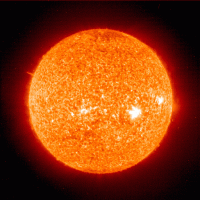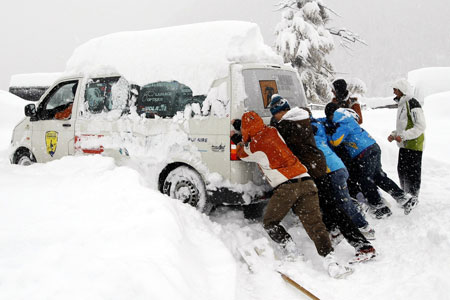
|
Nov 26, 2007
The Phenomenological Approach to Estimating the Effect of Total Solar Irradiance on Climate
Post by Paul on Jennifer Marohasy Blog
The flawed ‘hockey stick’ temperature reconstruction is used to reduce the role of the sun in climate change. Little pre-industrial temperature variability would help support the claim that 20th century warming is mainly anthropogenic in origin. Scafetta and West have recently published a continuation of their phenomenological approach to estimating the role of total solar irradiance (TSI) in climate change, which compares TSI reconstructions with temperature reconstructions.

Interestingly, Scafetta and West conclude that: “if we assume that the latest temperature and TSI secular reconstructions, WANG2005 and MOBERG05, are accurate, we are forced to conclude that solar changes significantly alter climate, and that the climate system responds relatively slowly to such changes with a time constant between 6 and 12 years. This would suggest that the large-scale computer models of climate could be significantly improved by adding additional Sun-climate coupling mechanisms.” See this blog here. Read Scafetta and West’s paper here.
Nov 25, 2007
Concerning the Current Consensus on Climate Change
By Sherwood, Keith and Craig Idso, CO2 Science
In a Policy Forum article inspired by the most recent report of the Intergovernmental Panel on Climate Change (IPCC), Oppenheimer et al. (2007) write in the 14 September issue of Science that “with the general credibility of the science of climate change established, it is now equally important that policy-makers understand the more extreme possibilities that consensus may exclude or downplay.” Why is that? Because, as they continue, “setting aside or minimizing the importance of key structural uncertainties in underlying processes is a frequent outcome of the drive for consensus.”
In light of this illuminating admission, we note that the setting aside of key uncertainties in the climate modeling enterprise could well lead to more extreme possibilities at both ends of the climate prognostication spectrum, such that not only may earth’s surface air temperature rise somewhat more than is predicted by the current IPCC consensus, it could equally as easily rise somewhat less than that august group has opined. And for the IPCC’s current full range prediction of 21st century warming (1.1-6.4°C), somewhat less warming could well turn out to be indistinguishable from no warming at all.
But how could this possibly be? The answer may well be found in the implementation of another important principle enunciated by Oppenheimer et al., i.e., their contention that the basis for quantitative uncertainty estimates “must be broadened to give observational, paleoclimatic, or theoretical evidence of poorly understood phenomena comparable weight with evidence from numerical modeling.” Read more of this CO2 Science editorial here.
Nov 25, 2007
Chris de Freitas: Don’t Blame Me for the Heat
By Chris de Freitas, New Zealand Herald
Greenpeace spokeswoman Susannah Bailey’s attack on branches of the New Zealand business sector, which she accuses of continuing to plead grey on global warming, misses the key point. Political action on climate change is not a game to be played and won or lost, and Greenpeace does us a disservice by encouraging that view. Little does the public realise the debate over climate change usually conflates issues of science and politics.
The robustness or otherwise of the science underpinning the role of greenhouse gases in the atmosphere is the key to assessing the risk from human induced climate change issue. But seldom if ever are the uncertainties of the science discussed. Seldom if ever is the question asked: Where is the evidence for catastrophic climate change from human action?
Rather than debate the issues, they attack those who disagree, using defamatory labels. Yet the opposite of scepticism is gullibility. Read more here.

Dr. Chris de Freitas is an associate professor in the School of Geography, Geology and Environmental Science, University of Auckland, and a scientific adviser to the New Zealand Climate Science Coalition.
Nov 20, 2007
Swiss Snow Sets 50-year Record
By FastTrack Ski News
Update: See also this story here.
Swiss ski resorts are expecting a record season after promising early snowfall, it has been reported. Ski break spots including Davos, St Antonien and Braunwald have experienced exceptionally strong snowfall for so early in the season, swissinfo has reported.
Last weekend, some 62 cm of the white stuff fell in the eastern resort of Davos, while St Antonien received 64 cm and Braunwald got 72 cm of snow on Sunday, according to the states national weather service MeteoSwiss. According to the report, Switzerland has not received such a strong start to its winter ski season since 1952, with the amount of snow being swept to the southern areas by the wind cited as a particularly interesting feature of the weather. Resorts are said to be anticipating a busy ski season, with many readying themselves for a rush of bookings as reports of the good weather disseminate.

Meanwhile, snow blizzards that continued for the third day have cut off a number of villages in central Serbia. Villages at the foot of Mt. Suvobor are the worst affected, reports say. No buses are traveling between the villages of Pranjani, Kamenica, Teo?in, Leuš?i, Koštuni?i and Brezna, and the nearest town of Gornji Milanovac, Beta has learned form the local bus company. A bus slid off the road in the area yesterday, due to high deposits of snow on the road surface, after which police blocked traffic on the regional route between Gornji Milanovac and Požega in western Serbia. Snow is falling unabated for the third day. Drivers are advised to drive carefully and use winter equipment for their vehicles.
Nov 16, 2007
Por qué no te callas Al Gore ?
By Alexandre Aguiar, MetSul Weather Center (Brazil)
During a summit in Chile King Juan Carlos of Spain told the president of Venezuela Hugo Chavez to shut up: “Por qué no te callas” (Why do you not shut up?). Someone must tell Al Gore the same or invite him to visit this corner of the world. It is a never ending winter here in South America. “What a hell is happening this year with a seven-month winter”, asked a famous TV journalist about the unusual climatic winter of 2007 that began with fury in May and still persist in November. Buenos Aires recorded this Thursday (November 15th) the lowest temperature for the month of November in 90 years. Temperature in the Downtown weather station reached 2.5C. Since records began more than a century ago, only two days had colder lows in November. It was in 1914 (1.6) and 1917 (2.4). And ninety years ago the urban heat island effect was much less pronounced than nowadays, what turns the temperature observed today remarkable.

In the southernmost state of Rio Grande do Sul in Brazil temperatures fell to 2.3ºC degrees in several towns near the border with Uruguay on Thursday. Wind and cloud cover prevented lower temperatures in the higher altitudes, but earlier in the week several towns in the Sierras region recorded temperatures near zero Celsius and frost. In Sao Joaquim, the low was 1.6 below zero with moderate frost on Monday (November 12th).
Further south, the problem is the excessive ice. The Brazilian Base Comandante Ferraz (file image above) in Antarctica is rationing water. Never in the last twenty years the weather was so cold and snowy this time of the year in the Brazilian post in the South Pole. The nearby lakes that provide water to the base are frozen since September. The heliport that allows the arrival of food and bottled water by air is under three meters of snow. Water for human consumption is limited to the fifty Brazilian researchers in the region and the situations turns more dangerous each day. So, por qué no te callas Al Gore ? Read more here.
|
|
|
|






